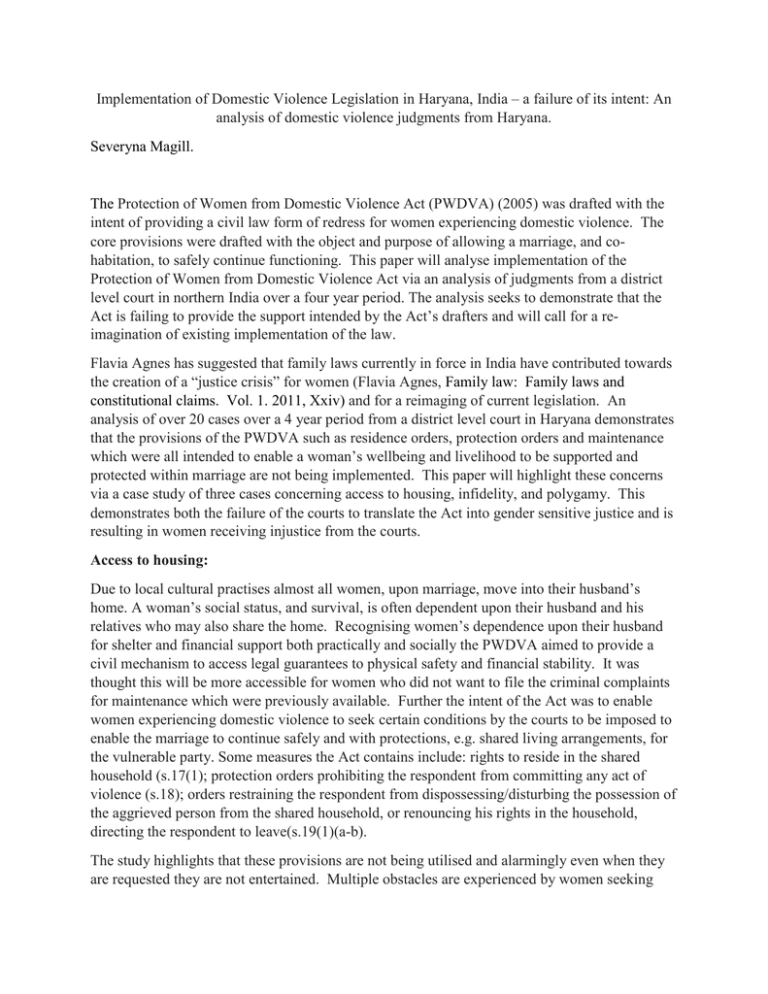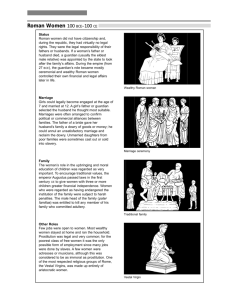Implementation of Domestic Violence Legislation in Haryana, India – a... analysis of domestic violence judgments from Haryana.
advertisement

Implementation of Domestic Violence Legislation in Haryana, India – a failure of its intent: An analysis of domestic violence judgments from Haryana. Severyna Magill. The Protection of Women from Domestic Violence Act (PWDVA) (2005) was drafted with the intent of providing a civil law form of redress for women experiencing domestic violence. The core provisions were drafted with the object and purpose of allowing a marriage, and cohabitation, to safely continue functioning. This paper will analyse implementation of the Protection of Women from Domestic Violence Act via an analysis of judgments from a district level court in northern India over a four year period. The analysis seeks to demonstrate that the Act is failing to provide the support intended by the Act’s drafters and will call for a reimagination of existing implementation of the law. Flavia Agnes has suggested that family laws currently in force in India have contributed towards the creation of a “justice crisis” for women (Flavia Agnes, Family law: Family laws and constitutional claims. Vol. 1. 2011, Xxiv) and for a reimaging of current legislation. An analysis of over 20 cases over a 4 year period from a district level court in Haryana demonstrates that the provisions of the PWDVA such as residence orders, protection orders and maintenance which were all intended to enable a woman’s wellbeing and livelihood to be supported and protected within marriage are not being implemented. This paper will highlight these concerns via a case study of three cases concerning access to housing, infidelity, and polygamy. This demonstrates both the failure of the courts to translate the Act into gender sensitive justice and is resulting in women receiving injustice from the courts. Access to housing: Due to local cultural practises almost all women, upon marriage, move into their husband’s home. A woman’s social status, and survival, is often dependent upon their husband and his relatives who may also share the home. Recognising women’s dependence upon their husband for shelter and financial support both practically and socially the PWDVA aimed to provide a civil mechanism to access legal guarantees to physical safety and financial stability. It was thought this will be more accessible for women who did not want to file the criminal complaints for maintenance which were previously available. Further the intent of the Act was to enable women experiencing domestic violence to seek certain conditions by the courts to be imposed to enable the marriage to continue safely and with protections, e.g. shared living arrangements, for the vulnerable party. Some measures the Act contains include: rights to reside in the shared household (s.17(1); protection orders prohibiting the respondent from committing any act of violence (s.18); orders restraining the respondent from dispossessing/disturbing the possession of the aggrieved person from the shared household, or renouncing his rights in the household, directing the respondent to leave(s.19(1)(a-b). The study highlights that these provisions are not being utilised and alarmingly even when they are requested they are not entertained. Multiple obstacles are experienced by women seeking redress from the Act at the court level: In case ‘A’1 a wife has alleged a husband owns a series of shops and receives a generous income from the same but she received no maintenance from him as she was unable to prove ownership and there was no onus to disprove the allegation on the husband. The burden of proof to prove ownership of property often falls on the woman, as does the burden to prove both income and ownership of additional property/assets that the husband may possess/receive financial rewards from. When women marry into families and live in patrilineal family owned property it is highly unlikely she will ever have been involved with the financial or other record keeping with property/other assets. It is therefore exceptionally hard for her to prove ownership or income generated. Rather than putting the burden on the woman to prove ownership of property or income greater efforts should be made to place the burden of providing evidence on the respondent and to retrieve the same by lawyers and judges from public records. Such action will recognise the position of disadvantage women are in when it comes to proving ownership and be compatible with the intent of securing substantive equality between men and women and justice. Infidelity: In case ‘B’2 a woman was married in 2001. From the beginning of her marriage she suspected her husband of engaging in extra-marital relations and of “frequently falling ill due to some sexually transmitted disease.” Upon examination “it was found he is HIV positive and the petitioner also contacted (sic) the same from the respondent”. When she confronted him he violently assaulted her. When she disclosed her concerns to her mother-in-law and sister-in-law they threatened to kill her if she disclosed this to anyone else. During this time she had two sons. The HIV may also have already been passed on to her children. The violence continued and in 2007 he again mercilessly beat her and then locked her in a room for two days which resulted in her hospitalisation. The police became involved but when her husband, who was responsible for the violence, pledged to keep her with “grace and dignity” she was returned to his home. Upon returning her husband started to demand 2 lakhs (2,000GBP) of cash as dowry and the violence resumed “after [a] lapse of 2-3 days”. After more violence she returned to her maternal home. Soon after “four-five muscle men” came and threatened her life if she did not return. She approached the women’s cell at the police station and the SHO demanded that she live with her husband with none of the protections that could have been afforded by the Act. After all of this violence and suffering the court issued a monthly maintenance of Rs.4,000 to be paid to support her and her two children, and Rs.2,500 for monthly residence. In addition the court ordered a one-time payment of Rs.10,000 to pay for “expenses, litigation and compensation.” This is less than 2 months of her income and 1/20th of the quantity of dowry he demanded. It not only fails to fully consider the cost of raising two young children and running a home but also completely fails to recognise the likely cost of medicines she will need to take in 1 2 Sarita v Pankaj, District Court Sonipat, unreported, date of decision 02.05.2014 Suman v Raj Kumar, District Court Sonipat, unreported, date of decision 30.04.2014 order to stabilise her health, now that she has also contracted HIV from her husband, as much as possible. Rs.10,000 is not even the compensatory value given by the court for the value of her life in its fullest and healthiest sense with the potential for re-marriage and a happy future – it is that of her life, her expenses and the cost of litigation. Such actions by the police and judgments from courts fail to reinforce the equal value of women’s and men’s lives and permits arbitrary notions of duty to be seen as more important than a right to physical, economic and emotional safety. With clear evidence to demonstrate domestic violence had occurred the police failed to utilise the protections available under the Act to secure her right to a safe lived reality. Such interpretations of the Act reinforces women’s weaker social position in their access to protection of the law and search for justice. Polygamy: Case ‘C’3 involved a woman who was married in 2010. The petitioner, who does not have any brothers, gave dowry at the time of the wedding but after the husband demanded 2 lakhs in cash and the transfer of her parents’ property to his name. During the start of her marriage her husband and his family members would beat her, keep her “as a slave” and even denied her food when she was pregnant. During her pregnancy she was forced to leave the house at midnight. She went to her parents’ house where she gave birth to a son. She also alleges he is currently unfaithful and has re-married by converting to Islam. The wife applied to the court using various provisions: she sought residence in the marital home and maintenance under sections 19 and 20 of the PWDVA respectively; maintenance under the CrPC; and cruelty and breach of trust under the IPC. Her father-in-law offered her accommodation in two rooms but these were “not in a condition to reside.” Despite a legal right to shelter and accommodation within the marital home, even a separate area within the home, and the court recognising that the husband “is having huge property and also taking care of oil agency” the court denied her claims for shelter within the home. The court rejected her application for residence in the marital home reasoning “the second marriage of the respondent no. 1 has already been admitted by the parties, therefore it will not be appropriate to allow the petitioner to live in shared household.” The court therefore undermines the status of the petitioner’s marriage for which there has been no divorce and her rights as a wife and the mother of her husband’s child in favour of a second marriage. Such actions not only challenge the status of their marriage and her legal rights as a wife but also goes against multiple Supreme Court of India judgments4 that conversion to Islam for the purposes of polygamy is not permissible and it reinforces male privilege: if the wife was accused of infidelity she would lose a claim to both property, maintenance and even custody of the children. When a man commits infidelity and violently forces his wife to leave she is again left without the security of physical 3 Sarita v Pankaj, District Court Sonipat, unreported, date of decision 02.05.2014 Sarla Mudgal versus Union of India 1995 AIR 1531; Lily Thomas versus Union of India, 2000 (6) SCC 224; Law Commission of India Report 227: Preventing Bigamy via Conversion to Islam – A Proposal for Giving Statutory Effect to Supreme Court Rulings (August 1997) 4 and social security. Such dual-disadvantage demonstrates the inherent lack of respect for women socially, a lack of true gender sensitivity in law and the failures of the law at the stage of interpretation and implementation to secure women’s rights and safety. Conclusion: The study demonstrates the deeply pervasive ‘male’ notions of equality prevalent in society that reinforce male privilege and permits law to become a source of injustice that reinforces multiple injustices women experience by virtue of their sex. Law, without adequate training of the judiciary, results in implementation of legal provisions not being gender-sensitive, rights based or consistent with the object and purpose of the Act. Courts, the source of justice for society, are currently the source of injustice for women.





